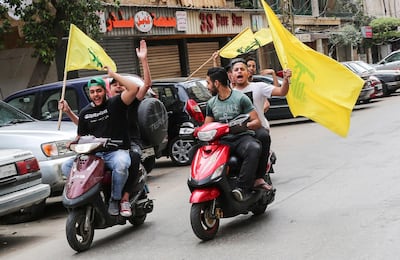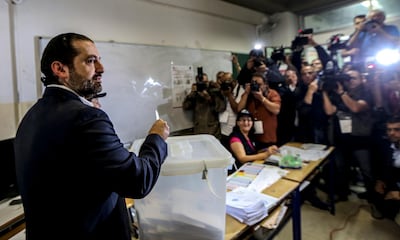The Iran-backed Shiite group Hezbollah has claimed a "major victory" in Sunday’s Lebanese election, before official results had been announced and amid reports of voting fraud.
Hezbollah and its political allies looked set to win more than half the seats in Lebanon's first parliamentary election in nine years, according to preliminary results cited by politicians and Lebanese media early on Monday.
The result, if confirmed by the final count, would boost Hezbollah politically, with parties and individuals aligned with the heavily armed militia securing a majority in parliament after Sunday's election. Such a gain would allow that bloc to veto legislation.
“This election is a great moral and political victory for the resistance that protects the country, Hezbollah leader Hassan Nasrallah told a press conference. “The resistance will continue because it has the trust and support of its people.”
Read more: Arab Youth Survey 2018: gloomy times for young people in the Levant
The head of Lebanese President Michel Aoun's Free Patriotic Movement says it has won at least 29 seats in parliamentary elections, making it the largest bloc in the assembly.
Gibran Bassil, who serves as foreign minister and heads Aoun's party, told reporters on Monday that their bloc could end up having 30 seats. He said it would maintain its "strategic alliance" with the Iran-backed Hezbollah militant group.
But the vote has been marred by accusations of vote-rigging, intimidation and fraud, despite the National Democratic Institute, which monitored the elections, saying that the elections were well run.
The Lebanese Association for Democratic Elections reported over 7,000 polling violations in Sunday's elections that saw fights break out in and around polling stations across the country. At least three candidates accused other parties of intimidation prior to and during the election.
Future TV, a broadcaster aligned with the Hariri family, reported that Hezbollah members had attempted to force election officials in the Baalbek/Hermel constituency to count folders of fake votes in order to disqualify the Future Movement’s winning candidate.
Hezbollah had lost ground in that stronghold. Two of the 10 seats there were won by its opponents, one going to the Lebanese Forces and the other to Future.
Samir Geagea, head of the Lebanese Forces party, said boxes had appeared there “that are not sealed with red wax and do not contain official signed records”. Without mentioning Hezbollah by name, he called on the Lebanese Interior Ministry to intervene and investigate.
David Daoud, research analyst on Hezbollah at US-based NGO United Against Nuclear Iran, said the reports were concerning.
"Hezbollah campaigned hard in the area to make sure either it or its allies won all of the seats. Given that didn't happen, and the group hasn't exactly been known to play fairly to achieve its desired results, they have opted for committing fraud," he said.
"It's worth considering whether the group has done the same in other districts as well".
Supporters of an outside candidate forecast to win a seat in parliament in Lebanon's national elections gathered outside the Interior Ministry to protest what they say are clear signs of fraud to deny her victory.
Joumana Haddad, a novelist and candidate with the independent Kulna Watani list – Arabic for "We are all patriots" – was forecast to win by the national media on Sunday, one of just two victories for the list.
But TV channels stopped reporting her victory on Monday, leading supporters to say they were robbed.
Lucian Bourjeily, a candidate with Watani, said "the people in power didn't like this result, so they proceeded with rigging the result in the last minute".
Hezbollah's powerful position in Lebanon reflects Iran's regional ascendancy through Iraq, Syria and all the way to Beirut. It is classified as a terrorist group by the United States and an enemy of neighbouring Israel.

Israeli politicians have already sounded alarm at a Hezbollah ascendency, with Israeli education minister Naftali Bennett tweeting that Lebanon now equals Hezbollah.
While Mr Nasrallah spoke of continuing the resistance against its arch-enemy Israel, he also struck a measured tone in regard to internal politics. "We must avoid any sectarian or inciting speeches," he said. "So that we avoid any conflict in the country."
Opponents of Hezbollah, including Mr Hariri, have called for the Shiite faction to disarm, but its leader said the vote had bolstered its position in the country.
"The make-up of the new legislative chamber represents a guarantee and a great strength to protect this strategic choice and to protect the golden equation - the army, the people and the resistance," Mr Nasrallah said.
At a press conference on Monday, Saudi-backed Prime Minister Saad Hariri said his Future Party had retained 21 seats in parliament, down from 33 previously. “We were betting on a better result, this is true,” Mr Hariri said.
Despite losing a third of his seats, Mr Hariri is likely to be the front-runner to form the next government. According to Lebanon’s sectarian power-sharing system, the prime minister must be a Sunni Muslim.
Mr Hariri said he was ready to work with all parties to form a government. “I extend my hand to all those keen on stability and on projects needed for the development of the country.
“Today we are in a new phase, and we have many challenges,” Hariri said. “As head of the Future Party, I will continue to battle these challenges on all levels.”
_______________
Read more:
In Lebanon, women vote but few are chosen
Lebanon paves way to election as regional tension soars
A bloody history that encapsulates Lebanon's woes
_______________
The new government, like the outgoing one, is expected to include several main parties, though talks over cabinet positions may slow the process.
The election was held under a complex new law that redrew constituency boundaries and changed the electoral system from winner-takes-all to a proportional one.
Turnout was 49.2 per cent, down from 54 per cent the last time legislative elections were held nine years ago.
Despite the new system, Lebanon's political divide also seems to have emerged from the poll. The staunchly anti-Hezbollah Lebanese Forces, a Christian party, emerged a big winner, nearly doubling its members of Parliament MPs to 15 from eight, according to unofficial reports.
Hezbollah and groups and individuals affiliated to it secured at least 67 seats, according to a Reuters calculation based on preliminary results for nearly all the seats that were obtained from politicians and campaigns and reported in Lebanese media.
Hezbollah's allies include the Shiite Amal Movement led by Parliament Speaker Nabih Berri, the Christian Free Patriotic Movement established by President Michel Aoun and other groups and individuals that view its weapons as an asset to Lebanon.

Hezbollah-backed Sunnis did well in the cities of Beirut, Tripoli and Sidon, strongholds of Mr Hariri's Future Movement, the unofficial results showed.
Hezbollah-backed winners include Jamil Al Sayyed, a retired Shiite general and former Lebanese intelligence chief who is a close friend of Syrian President Bashar Al Assad, according to the unofficial results.
Mr Sayyed was one of the most powerful men in Lebanon in the 15 years of Syrian domination that followed the 1975-90 civil war. Another face from that era, Abdul Rahim Mrad, will also make a comeback having won a Sunni seat, the unofficial results show.
Lebanon should have held a parliamentary election in 2013 but MPs instead voted to extend their own term because leaders could not agree on a new parliamentary election law.











